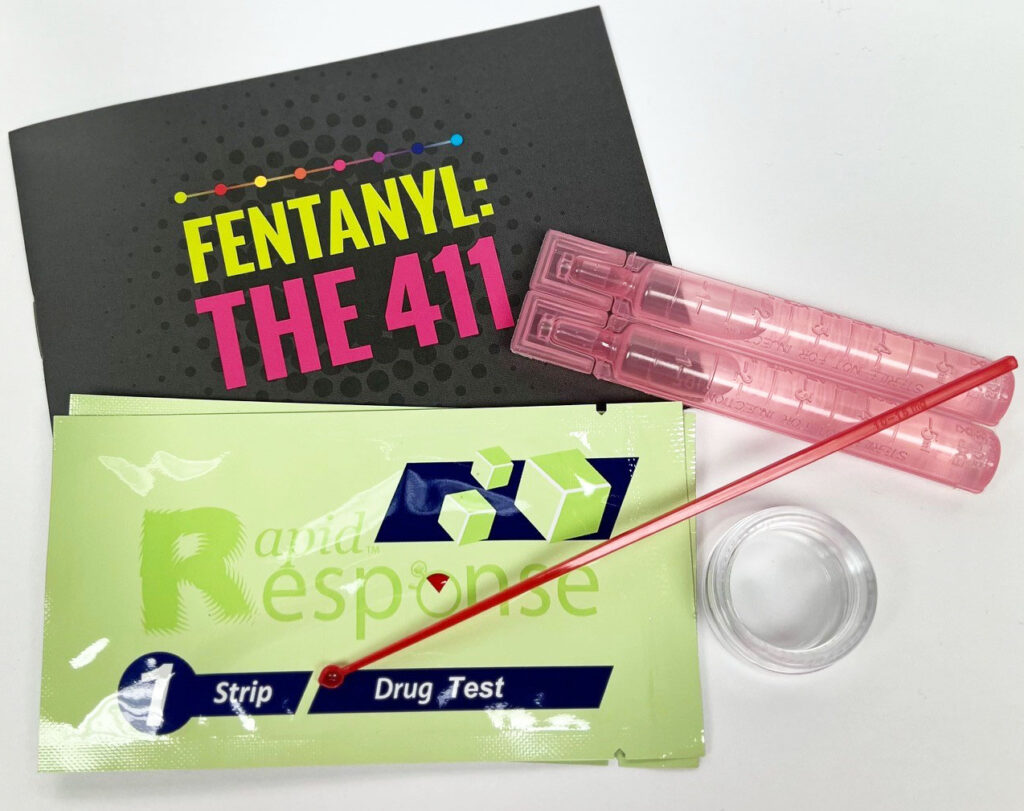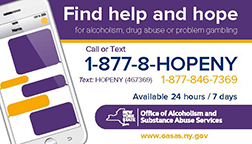In addition to offering opioid overdose education and free naloxone kits, the Prevention Council of Putnam is committed to offering other evidence-based strategies to reduce the harms of substance use.
Fentanyl Test Kits
- Fentanyl Test Strips are a tool used by people who use drugs to test their substances for the presence of fentanyl in order to avoid overdose or other negative outcomes. If there is fentanyl detected in a substance the person can make a choice that’s best for them. These choices could include not using the substance, or using the substance with more safety parameters in place such as:
- Having naloxone ready and accessible
- Having a designated sober person to call for emergency services as needed
- Use the “Never Use Alone” hotline
- In February 2023, OASAS released guidance on what should be included in a Fentanyl Test Kit. From OASAS’ guidance and collected guidance from other revered harm reductions resources, the Prevention Council has developed a Fentanyl Test Kit that includes:
- 2 Fentanyl Test Strips2 Liquid solutionsOne test BasinOne Micro Scoop
- One NYDOH Fentanyl Information Booklet
- Fentanyl Test Kits are free to consumers, and cost our agency about 0.81 cents per kit after generous donations from harm reduction resources in NYS.
Fentanyl and Xylanzine test strip Instruction video – Click Here
Certified Peer Recovery Advocate
- The Recovery Peer Advocate is a certified, peer-based recovery support service that is non-clinical and designed to engage others beyond initiation through stabilization and into recovery maintenance. For more information visit our Peer Recovery Advocate page.
Medication for Opioid Use Disorder
- The FDA has approved three medications to treat Opioid Use Disorder; buprenorphine (example: Suboxone, Subutex, Sublocade), naltrexone (Vivitrol) and methadone.
- Recent changes in legislation no longer require prescribers to have special status to prescribe buprenorphine. Prescribers do need special status to prescribe and dispense methadone.
Safe Medication Disposal
- Safely disposing of unused or expired medication both over the counter and prescription medication, reduces the risk of diversion, misuse, accidental ingestion and environmental pollution
- Putnam County hosts medication disposal boxes at various locations throughout the county. These boxes allow for safe medication disposal year round and are free of charge to the consumer.
- Deterra Bags are a medication deactivation system that uses a specialized carbon element to deactivate substances in a small bag which can be disposed of safely in your own home garbage. These bags can be obtained from the Prevention Council of Putnam either for personal use, or to supply your school, library or other organization.
Sharps:
- Sharps are defined as:
- Needle
- Syringes
- Lancets
- Auto Injectors
- Most sharps are designed for single use and should be used accordingly to prevent communicable disease or infection.
- To store sharps in the home between disposals:
- Use a designated sharps container.
- If you do not have access to a designated sharps box, use an empty, hard plastic container with a screw-top lid, such as a laundry detergent bottle.
- Don’t store your sharps in:
- Glass or soda bottles
- Milk jugs
- Aluminum or coffee cans
- Paper or plastic bags
- Clearly label the container “Home Medical Sharps – Not for Recycling.” Keep it away from children and pets.
- Put the sharps in the container as soon as you’re done using them. Place them point first into the container.
- Don’t overfill the container. When it’s more than half full, stop using it. Wrap the lid with strong tape. This will create a more secure seal and keep it from leaking.
Safe Syringe Access
- In 2000, the New York State Legislature changed the Public Health Law to authorize a demonstration program to expand access to sterile hypodermic needles and syringes. This is a public health measure to prevent blood borne diseases, most notably HIV/AIDS and hepatitis B and hepatitis C. ESAP became effective January 1, 2001 and as of the summer of 2009, became a permanent program.
- Currently, there is only one pharmacy participating in the Expanded Syringe Exchange Program (ESAP) through NYS Department of Health.
Safe Syringe Disposal
- Currently, Putnam County Residents can dispose of syringes at the Putnam Hospital Center Monday through Friday 9am-4pm.
Never Use Alone
Hotline 800-484-3731.


